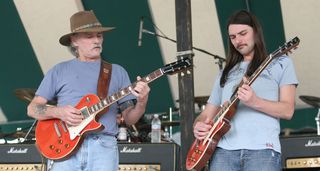Duane Betts has been speaking publicly for the first time since his father, Dickey Betts, passed away in April, paying a warm tribute to his father's talent as a guitar player and sharing some of the advice he received from the late southern rock icon.
Speaking to Guitar World, Betts said his father’s playing was all about being “in a zone” and the kind of situational awareness that a player needs to play the right part.
“When I was really young, I asked him how he got the guitar to sound like that; and he said, ‘Go play to nature, and it can never be wrong,’” says Betts. “So If it fits with what’s happening in your surroundings, then it’s right.”
Betts evidently absorbed that wisdom. It would have been impossible to have grown up in that environment, surrounded by the music of the Allman Brothers Band, and not have that influence how you address the electric guitar, and the kinds of notes you want to play.
Duane Betts has performed his share of Allman Brothers standards over the years, with his father and without, helping to keep the band’s storied legacy alive when playing with The Allman Betts Band, the group he formed alongside the Devon Allman and Berry Duane Oakley – all three of them sons of Allman Brothers founding members. If you catch The Allman Betts Band live you’ll find they typically throw in three or four Allman Brothers covers in a set.
There was an edge-of-your-seat quality about the way my father played,” he says. “If I have a little bit of that, it’s a great thing
But Betts says he has found an ease with his own style, and if any comparisons between him and his father preyed on his mind when he was younger, it was a different story now. He described it as a blessing to be associated with his father’s legacy. To have a little of his playing style in his own could only be a good thing.
“There was an edge-of-your-seat quality about the way my father played,” he says. “If I have a little bit of that, it’s a great thing. To channel that and go for it is one of the most enjoyable and freeing parts of playing music and guitar. It’s an endless expression.”
Ultimately, as Betts explains, what made his father such a phenomenal musician was the fact that his guitar playing could be off-the-cuff but always sounded considered. Like all the great players, Dickey Betts didn’t waste a note.
“He was a very melodic player,” says Betts. “He wasn’t always just pulling things out of his bag of licks. He had such a beautiful way of phrasing and intertwining, even though it was made up on the spot.”


